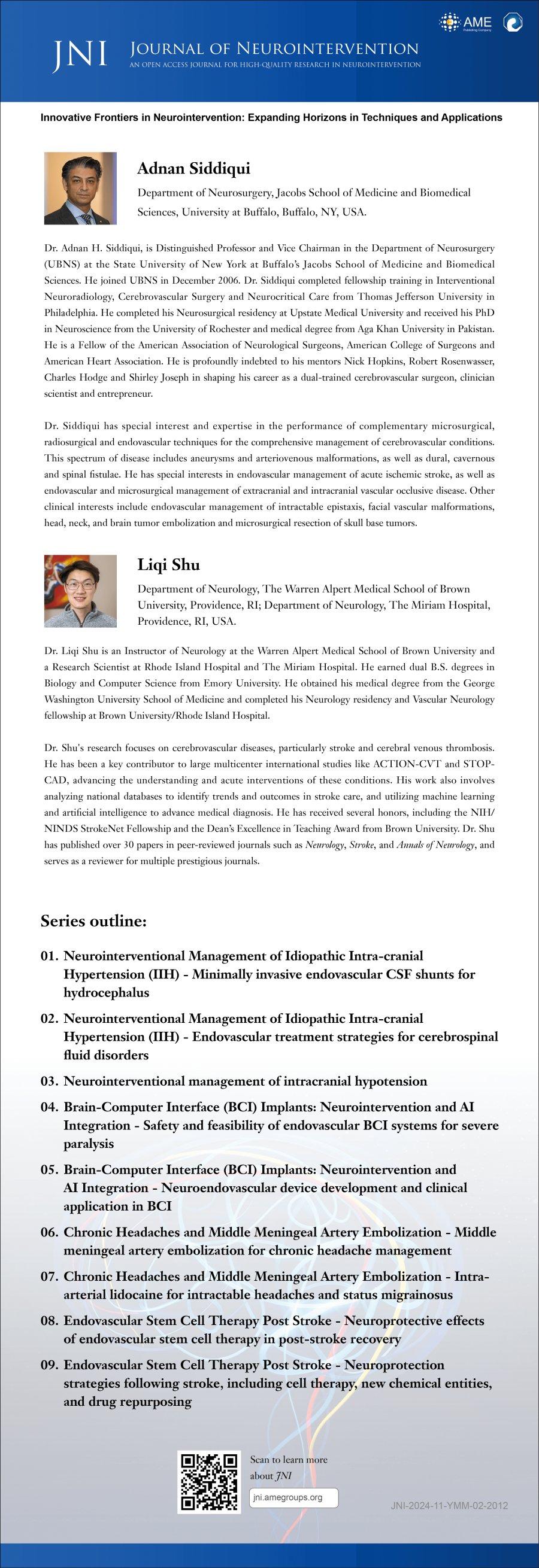
This special series on “Innovative Frontiers in Neurointervention: Expanding Horizons in Techniques and Applications”is edited by Dr. Adnan Siddiqui (Department of Neurosurgery, Jacobs School of Medicine and Biomedical Sciences, University at Buffalo, Buffalo, NY, USA) and Dr. Liqi Shu (Department of Neurology, The Warren Alpert Medical School of Brown University, Providence, RI; Department of Neurology, The Miriam Hospital, Providence, RI, USA).
Adnan Siddiqui
Department of Neurosurgery, Jacobs School of Medicine and Biomedical Sciences, University at Buffalo, Buffalo, NY, USA.
Dr. Adnan H. Siddiqui, is Distinguished Professor and Vice Chairman in the Department of Neurosurgery (UBNS) at the State University of New York at Buffalo’s Jacobs School of Medicine and Biomedical Sciences. He joined UBNS in December 2006. Dr. Siddiqui completed fellowship training in Interventional Neuroradiology, Cerebrovascular Surgery and Neurocritical Care from Thomas Jefferson University in Philadelphia. He completed his Neurosurgical residency at Upstate Medical University and received his PhD in Neuroscience from the University of Rochester and medical degree from Aga Khan University in Pakistan. He is a Fellow of the American Association of Neurological Surgeons, American College of Surgeons and American Heart Association. He is profoundly indebted to his mentors Nick Hopkins, Robert Rosenwasser, Charles Hodge and Shirley Joseph in shaping his career as a dual-trained cerebrovascular surgeon, clinician scientist and entrepreneur.
Dr. Siddiqui has special interest and expertise in the performance of complementary microsurgical, radiosurgical and endovascular techniques for the comprehensive management of cerebrovascular conditions. This spectrum of disease includes aneurysms and arteriovenous malformations, as well as dural, cavernous and spinal fistulae. He has special interests in endovascular management of acute ischemic stroke, as well as endovascular and microsurgical management of extracranial and intracranial vascular occlusive disease. Other clinical interests include endovascular management of intractable epistaxis, facial vascular malformations, head, neck, and brain tumor embolization and microsurgical resection of skull base tumors.
Liqi Shu
Department of Neurology, The Warren Alpert Medical School of Brown University, Providence, RI; Department of Neurology, The Miriam Hospital, Providence, RI, USA.
Dr. Liqi Shu is an Instructor of Neurology at the Warren Alpert Medical School of Brown University and a Research Scientist at Rhode Island Hospital and The Miriam Hospital. He earned dual B.S. degrees in Biology and Computer Science from Emory University. He obtained his medical degree from the George Washington University School of Medicine and completed his Neurology residency and Vascular Neurology fellowship at Brown University/Rhode Island Hospital.
Dr. Shu's research focuses on cerebrovascular diseases, particularly stroke and cerebral venous thrombosis. He has been a key contributor to large multicenter international studies like ACTION-CVT and STOP-CAD, advancing the understanding and acute interventions of these conditions. His work also involves analyzing national databases to identify trends and outcomes in stroke care, and utilizing machine learning and artificial intelligence to advance medical diagnosis. He has received several honors, including the NIH/NINDS StrokeNet Fellowship and the Dean’s Excellence in Teaching Award from Brown University. Dr. Shu has published over 30 papers in peer-reviewed journals such as Neurology, Stroke, and Annals of Neurology, and serves as a reviewer for multiple prestigious journals.
Series outline:
- Neurointerventional Management of Idiopathic Intra-cranial Hypertension (IIH) - Minimally invasive endovascular CSF shunts for hydrocephalus
- Neurointerventional Management of Idiopathic Intra-cranial Hypertension (IIH) - Endovascular treatment strategies for cerebrospinal fluid disorders
- Neurointerventional management of intracranial hypotension
- Brain-Computer Interface (BCI) Implants: Neurointervention and AI Integration - Safety and feasibility of endovascular BCI systems for severe paralysis
- Brain-Computer Interface (BCI) Implants: Neurointervention and AI Integration - Neuroendovascular device development and clinical application in BCI
- Chronic Headaches and Middle Meningeal Artery Embolization - Middle meningeal artery embolization for chronic headache management
- Chronic Headaches and Middle Meningeal Artery Embolization - Intra-arterial lidocaine for intractable headaches and status migrainosus
- Endovascular Stem Cell Therapy Post Stroke - Neuroprotective effects of endovascular stem cell therapy in post-stroke recovery
- Endovascular Stem Cell Therapy Post Stroke - Neuroprotection strategies following stroke, including cell therapy, new chemical entities, and drug repurposing
Disclosure:
The special series “Innovative Frontiers in Neurointervention: Expanding Horizons in Techniques and Applications” was commissioned by the editorial office, Journal of Neurointervention without any sponsorship or funding. Dr. Adnan Siddiqui and Dr. Liqi Shu are serving as unpaid Guest Editors for the special series.